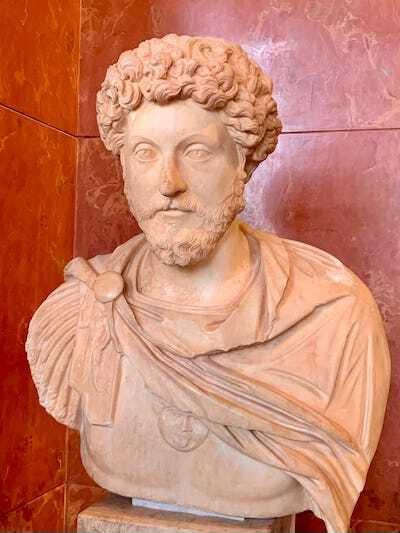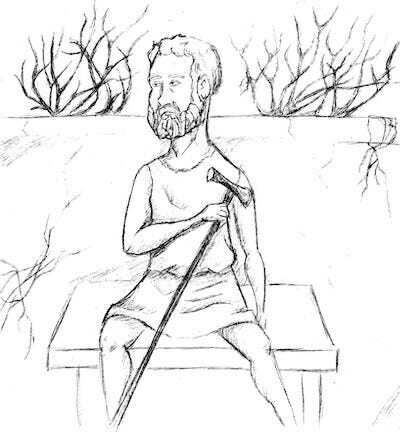Massimo Pigliucci's Blog, page 18
April 1, 2024
Practice like a Stoic: 4, Take another's perspective
 Marcus Aurelius, Louvre Museum, photo by the Author.
Marcus Aurelius, Louvre Museum, photo by the Author.[This series of posts is based on A Handbook for New Stoics—How to Thrive in a World out of Your Control, co-authored by yours truly and Greg Lopez. It is a collection of 52 exercises, which we propose reader try out one per week during a whole year, to actually live like a Stoic. In Europe/UK the book is published by Rider under the title Live Like A Stoic. Below is this week’s prompt and a brief explanation of the pertinent philosophical back...
March 29, 2024
Epictetus on the Stoic opposition
“Helvidius Priscus saw this, too, and acted on the insight.
When Vespasian told him not to attend a meeting of the Senate, he replied, ‘You have the power to disqualify me as a senator, but as long as I am one, I’m obliged to attend meetings.’
‘All right, then, attend the meeting,’ says Vespasian, ‘but don’t say anything.’ ‘Don’t ask me for my opinion and I’ll keep quiet.’
‘But I’m bound to ask you.’ ‘And I’m bound to say what seems right.’
‘But if you speak, I’ll have you killed.’ ‘Did I ever tell ...
March 27, 2024
Virtue ethics, rules, and consequences
 Image under CC license.
Image under CC license.What does it mean to be ethical? There are three major frameworks to answer that question: deontology, consequentialism, and virtue ethics.
(In the following I will use the words ethics and morality interchangeably, since “ethics” comes from the Greek ēthos, meaning either character or custom, a word that Cicero, in De Fato 2.1, translated into Latin as moralis, meaning proper behavior as well as, again, custom.)
Virtue ethics was developed by Socrates, Aristotle, the Stoics...
March 25, 2024
Practice like a Stoic: 3, Take an outside view
 Image from live.staticflickr.com, under CC license.
Image from live.staticflickr.com, under CC license.[This series of posts is based on A Handbook for New Stoics—How to Thrive in a World out of Your Control, co-authored by yours truly and Greg Lopez. It is a collection of 52 exercises, which we propose reader try out one per week during a whole year, to actually live like a Stoic. In Europe/UK the book is published by Rider under the title Live Like A Stoic. Below is this week’s prompt and a brief explanation of the pertinent philosophical backg...
March 22, 2024
Plato on courage in battle
“[Socrates] First of all, then, let’s try to say what bravery is, Laches; and after that we’ll investigate any ways of adding it to young men, in so far as it may be possible to do so by means of various activities and disciplines. So, as I say, try to put into words what bravery is.
[Laches] My word, Socrates, that’s not difficult! If a man is prepared to stand in the ranks, face up to the enemy and not run away, you can be sure that he’s brave. …
[Socrates] But what about another man, a man who ...
March 20, 2024
Video chat: Jeff Beneker on Plutarch and leadership

Welcome to the sixth of an occasional series of video chats with authors and translators who have written about the philosophy, culture, and history of the Greco-Roman tradition.
In this episode I talk to Jeff Beneker, a classicist at the University of Wisconsin-Madison. Jeff’s primary research interest is in Greco-Roman biography and historiography. He has written a book on Plutarch’s biographical method, The Passionate Statesman: Eros and Politics in Plutarch’s Lives (Oxford University Press 20...
March 18, 2024
Practice like a Stoic: 2, Focus on what is completely in your control
 Epictetus, image from thereitis.org, under CC license.
Epictetus, image from thereitis.org, under CC license.[This series of posts is based on A Handbook for New Stoics—How to Thrive in a World out of Your Control, co-authored by yours truly and Greg Lopez. It is a collection of 52 exercises, which we propose reader try out one per week during a whole year, to actually live like a Stoic. In Europe/UK the book is published by Rider under the title Live Like A Stoic. Below is this week’s prompt and a brief explanation of the pertinent philosophical ba...
March 15, 2024
Cicero on the right time to die
“The case of our friend Pompey was something better: once, when he had been very ill at Naples, the Neapolitans, on his recovery, put crowns on their heads, as did those of Puteoli; the people flocked from the country to congratulate him—it is a Grecian custom, and a foolish one; still, it is a sign of good fortune.
But the question is, had he died, would he have been taken from good, or from evil?
Certainly from evil. He would not have been engaged in a war with his father-in-law; he would not ha...
March 13, 2024
How to innovate with Aristotle
 Based on How to Innovate: An Ancient Guide to Creative Thinking, by Aristotle, translated by Armand D’Angour. Full book series here.
Based on How to Innovate: An Ancient Guide to Creative Thinking, by Aristotle, translated by Armand D’Angour. Full book series here.νέα ἐϕ’ ἡμέρῃ ϕρονέοντϵς
(Thinking new thoughts every day)
—Democritus, 5th century BCE
Turns out, the word “innovation” ain’t new at all. It’s earliest known use is in Greek (of course): kainotomia, and is found in a fifth century BCE comic play by Aristophanes. Funny, since the Greeks are often (and falsely) said not to have been innovators.
Armand D’Angour, the trans...
March 11, 2024
Practice like a Stoic: 1, Discover what’s really in your control
 Epictetus, image from thereitis.org, under CC license.
Epictetus, image from thereitis.org, under CC license.[This series of posts is based on A Handbook for New Stoics—How to Thrive in a World out of Your Control, co-authored by yours truly and Greg Lopez. It is a collection of 52 exercises, which we propose reader try out one per week during a whole year, to actually live like a Stoic. Below is this week’s prompt and a brief explanation of the pertinent philosophical background. Check the book for details on how to practice the exercise, download ...



